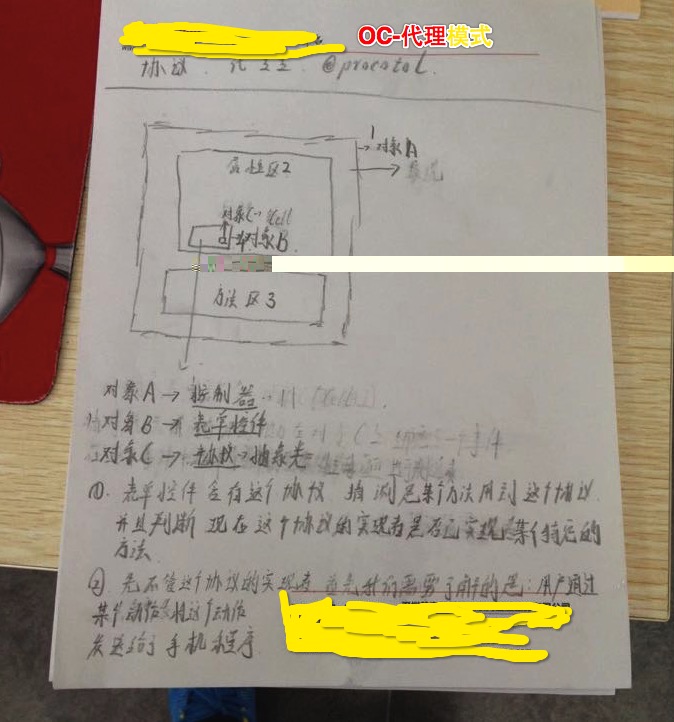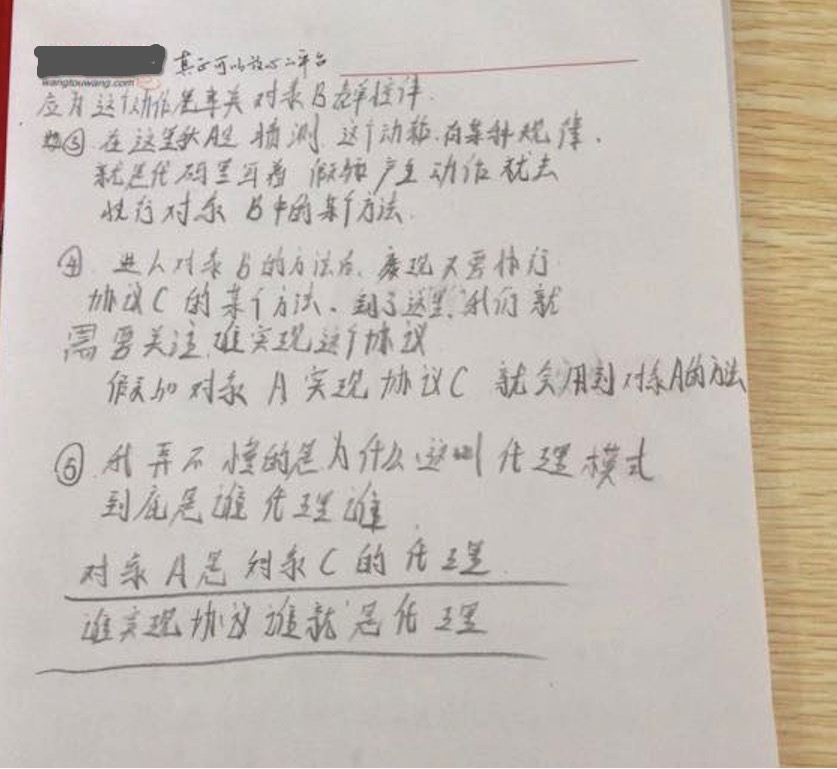IOS 学习笔记 2015-03-27 我理解的OC-代理模式


案例1
KCButton.h // // KCButton.h // Protocol&Block&Category // // Created by Kenshin Cui on 14-2-2. // Copyright (c) 2014年 Kenshin Cui. All rights reserved. // #import <Foundation/Foundation.h> @class KCButton; //一个协议可以扩展另一个协议,例如KCButtonDelegate扩展了NSObject协议 @protocol KCButtonDelegate <NSObject> @required //@required修饰的方法必须实现 -(void)onClick:(KCButton *)button; @optional //@optional修饰的方法是可选实现的 -(void)onMouseover:(KCButton *)button; -(void)onMouseout:(KCButton *)button; @end @interface KCButton : NSObject #pragma mark - 属性 #pragma mark 代理属性,同时约定作为代理的对象必须实现KCButtonDelegate协议 @property (nonatomic,retain) id<KCButtonDelegate> delegate; #pragma mark - 公共方法 #pragma mark 点击方法 -(void)click; @end
KCButton.m // // KCButton.m // Protocol&Block&Category // // Created by Kenshin Cui on 14-2-2. // Copyright (c) 2014年 Kenshin Cui. All rights reserved. // #import "KCButton.h" @implementation KCButton -(void)click{ NSLog(@"Invoke KCButton's click method."); //判断_delegate实例是否实现了onClick:方法(注意方法名是"onClick:",后面有个:) //避免未实现ButtonDelegate的类也作为KCButton的监听 if([_delegate respondsToSelector:@selector(onClick:)]){ [_delegate onClick:self]; } } @end MyListener.h // // MyListener.h // Protocol&Block&Category // // Created by Kenshin Cui on 14-2-2. // Copyright (c) 2014年 Kenshin Cui. All rights reserved. // #import <Foundation/Foundation.h> @class KCButton; @protocol KCButtonDelegate; @interface MyListener : NSObject<KCButtonDelegate> -(void)onClick:(KCButton *)button; @end MyListener.m // // MyListener.m // Protocol&Block&Category // // Created by Kenshin Cui on 14-2-2. // Copyright (c) 2014年 Kenshin Cui. All rights reserved. // #import "MyListener.h" #import "KCButton.h" @implementation MyListener -(void)onClick:(KCButton *)button{ NSLog(@"Invoke MyListener's onClick method.The button is:%@.",button); } @end main.m // // main.m // Protocol&Block&Category // // Created by Kenshin Cui on 14-2-2. // Copyright (c) 2014年 Kenshin Cui. All rights reserved. // #import <Foundation/Foundation.h> #import "KCButton.h" #import "MyListener.h" int main(int argc, const char * argv[]) { @autoreleasepool { KCButton *button=[[KCButton alloc]init]; MyListener *listener=[[MyListener alloc]init]; button.delegate=listener; [button click]; /* 结果: Invoke KCButton's click method. Invoke MyListener's onClick method.The button is:<KCButton: 0x1001034c0>. */ } return 0; }
我们通过例子模拟了一个按钮的点击过程,有点类似于Java中事件的实现机制。通过这个例子我们需要注意以下几点内容: id可以表示任何一个ObjC对象类型,类型后面的”<协议名>“用于约束作为这个属性的对象必须实现该协议(注意:使用id定义的对象类型不需要加“*”); MyListener作为事件触发者,它实现了KCButtonDelegate代理(在ObjC中没有命名空间和包的概念,通常通过前缀进行类的划分,“KC”是我们自定义的前缀) 在.h文件中如果使用了另一个文件的类或协议我们可以通过@class或者@protocol进行声明,而不必导入这个文件,这样可以提高编译效率(注意有些情况必须使用@class或@protocol,例如上面KCButton.h中上面声明的KCButtonDelegate协议中用到了KCButton类,而此文件下方的KCButton类声明中又使用了KCButtonDelegate,从而形成在一个文件中互相引用关系,此时必须使用@class或者@protocol声明,否则编译阶段会报错),但是在.m文件中则必须导入对应的类声明文件或协议文件(如果不导入虽然语法检查可以通过但是编译链接会报错); 使用respondsToSelector方法可以判断一个对象是否实现了某个方法(需要注意方法名不是”onClick”而是“onClick:”,冒号也是方法名的一部分); 属性中的(nonatomic,retain)不是这篇文章的重点,在接下来的文章中我们会具体介绍。
案例2
// // WPContactsViewController.h // OC-UI-表单-单元格 // // Created by wangtouwang on 15/3/26. // Copyright (c) 2015年 wangtouwang. All rights reserved. // #import <UIKit/UIKit.h> @interface WPContactsViewController : UIViewController { UITableView *_tableView;//表单UI控件 NSMutableArray *_mutableArrayContacts;//联系人集合模型 NSIndexPath *_selectedIndexPath;//当前选中的组和行 } @end
// // WPContactsViewController.m // OC-UI-表单-单元格 // // Created by wangtouwang on 15/3/26. // Copyright (c) 2015年 wangtouwang. All rights reserved. // #import "WPContactsViewController.h" #import "WPContacts.h" #import "WPContactsGroup.h" @interface WPContactsViewController ()<UITableViewDataSource,UITableViewDelegate,UIAlertViewDelegate> @end @implementation WPContactsViewController - (void)viewDidLoad { [super viewDidLoad]; //初始化数据 [self initObjectData]; //创建一个分组样式的UITableView _tableView=[[UITableView alloc]initWithFrame:self.view.bounds style:UITableViewStyleGrouped]; //设置数据源,注意必须实现对应的UITableViewDataSource协议 _tableView.dataSource=self; //设置代理 _tableView.delegate=self; [self.view addSubview:_tableView]; } - (void)didReceiveMemoryWarning { [super didReceiveMemoryWarning]; // Dispose of any resources that can be recreated. } #pragma mark 加载数据 -(void)initObjectData{ _mutableArrayContacts=[[NSMutableArray alloc]init]; WPContacts *contact1=[WPContacts initStaticWithFirstName:@"Cui" andLastName:@"Kenshin" andPhoneNumber:@"18500131234"]; WPContacts *contact2=[WPContacts initStaticWithFirstName:@"Cui" andLastName:@"Tom" andPhoneNumber:@"18500131237"]; WPContactsGroup *group1=[WPContactsGroup initStaticWithName:@"C" andDescript:@"With names beginning with C" andConcats:[NSMutableArray arrayWithObjects:contact1,contact2, nil]]; [_mutableArrayContacts addObject:group1]; WPContacts *contact3=[WPContacts initStaticWithFirstName:@"Dui" andLastName:@"JACK" andPhoneNumber:@"13712133321"]; WPContacts *contact4=[WPContacts initStaticWithFirstName:@"Dui" andLastName:@"LUCY" andPhoneNumber:@"13712133322"]; WPContactsGroup *group2=[WPContactsGroup initStaticWithName:@"D" andDescript:@"With names beginning with D" andConcats:[NSMutableArray arrayWithObjects:contact3,contact4, nil]]; [_mutableArrayContacts addObject:group2]; } #pragma mark 返回分组数 -(NSInteger)numberOfSectionsInTableView:(UITableView *)tableView{ NSLog(@"计算分组数"); return _mutableArrayContacts.count; } #pragma mark 返回每组行数 - (NSInteger)tableView:(UITableView *)tableView numberOfRowsInSection:(NSInteger)section{ NSLog(@"计算每组(组%lu)行数",(unsigned long)section); // WPContactsGroup *group1 = _mutableArrayContacts[section]; return ((WPContactsGroup *)_mutableArrayContacts[section])._concats.count; } #pragma mark返回每行的单元格 - (UITableViewCell *)tableView:(UITableView *)tableView cellForRowAtIndexPath:(NSIndexPath *)indexPath{ NSLog(@"生成单元格(组:%lu,行%lu)",(unsigned long)indexPath.section,(unsigned long)indexPath.row); WPContactsGroup *group= _mutableArrayContacts[indexPath.section]; WPContacts *contacts = group._concats[indexPath.row]; UITableViewCell *cell = [[UITableViewCell alloc] initWithStyle:UITableViewCellStyleValue1 reuseIdentifier:nil]; cell.textLabel.text=[contacts getName]; cell.detailTextLabel.text = [contacts _phoneNumber]; return cell; } #pragma mark 返回每组头标题名称 - (NSString *)tableView:(UITableView *)tableView titleForHeaderInSection:(NSInteger)section{ NSLog(@"生成组(组%lu)名称",(unsigned long)section); WPContactsGroup *group = _mutableArrayContacts[section]; return group._name; } #pragma mark 返回每组尾部说明 - (NSString *)tableView:(UITableView *)tableView titleForFooterInSection:(NSInteger)section{ NSLog(@"生成尾部(组%lu)详情",(unsigned long)section); return ((WPContactsGroup *)_mutableArrayContacts[section])._descript; } #pragma mark 生成索引 - (NSArray *)sectionIndexTitlesForTableView:(UITableView *)tableView{ NSLog(@"生成组索引"); NSMutableArray *indexs = [[NSMutableArray alloc] init]; for (WPContactsGroup *group in _mutableArrayContacts) { [indexs addObject:group._name]; } return indexs; } #pragma mark 设置分组标题高度 - (CGFloat)tableView:(UITableView *)tableView heightForHeaderInSection:(NSInteger)section{ NSLog(@"设置分组标题高度"); return 25; } #pragma mark 设置分组尾部内容高度 - (CGFloat)tableView:(UITableView *)tableView heightForFooterInSection:(NSInteger)section{ NSLog(@"设置分组尾部内容高度"); return 20; } #pragma mark 设置每行高度 - (CGFloat)tableView:(UITableView *)tableView heightForRowAtIndexPath:(NSIndexPath *)indexPath{ NSLog(@"设置每行高度"); return 30; } #pragma mark 复写设置点击行触发事件(复写的方法是在TableViewDelegate协议中已有,回调) -(void)tableView:(UITableView *)tableView didSelectRowAtIndexPath:(NSIndexPath *)indexPath{ NSLog(@"触发我吧"); _selectedIndexPath=indexPath; //获取单元格包装的对象WPContacts WPContacts *contacts = ((WPContactsGroup *)_mutableArrayContacts[indexPath.section])._concats[indexPath.row]; //初始化弹出框 UIAlertView *alertView = [[UIAlertView alloc] initWithTitle:@"System Info" message:[contacts getName] delegate:self cancelButtonTitle:@"Cancle" otherButtonTitles:@"OK", nil]; //设置窗口样式 alertView.alertViewStyle=UIAlertViewStylePlainTextInput; //获取文本框 UITextField *textFild = [alertView textFieldAtIndex:0]; //设置文本框内容 textFild.text = contacts._phoneNumber; //显示窗口 [alertView show]; } #pragma mark 设置弹出框后续按钮事件 复写UIAlerViewDelegate协议 的点击按钮 clickedButtonAtIndex方法 - (void)alertView:(UIAlertView *)alertView clickedButtonAtIndex:(NSInteger)buttonIndex{ NSLog(@"设置弹出框后续按钮事件 clickedButtonAtIndex"); if (buttonIndex==1) { //获取文本框内容 NSString *phoneNumber = [alertView textFieldAtIndex:0].text; //获取选中的UITableViewCell 包装的对象 WPContacts *contacts = ((WPContactsGroup *)_mutableArrayContacts[_selectedIndexPath.section])._concats[_selectedIndexPath.row]; contacts._phoneNumber = phoneNumber; NSArray *indexPaths=@[_selectedIndexPath];//需要局部刷新的单元格的组、行 //此处优化 将全局跟新 该变到 选择行 局部更新 [_tableView reloadRowsAtIndexPaths:indexPaths withRowAnimation:UITableViewRowAnimationLeft]; //[_tableView reloadData]; } } @end



